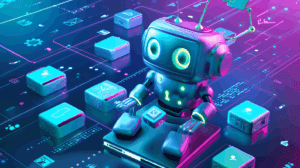Understanding Agentic AI
Agentic AI represents a transformative approach to artificial intelligence, enabling systems to act autonomously and make decisions without direct human intervention. In understanding AI agents, it is crucial to recognize their ability to learn, adapt, and optimize performance over time based on data and experiences. Unlike traditional AI systems, which follow pre-defined algorithms, agentic AI can engage in complex problem-solving and adjust its strategies in real-time. The role of agentic AI is becoming increasingly prominent across various industries. In the realm of finance, for instance, agentic AI facilitates real-time decision-making by interfacing with multiple data sources, thus enhancing operational efficiency and effectiveness. Banks utilize such systems to manage extensive, fragmented information, effectively creating a “single brain” that processes data seamlessly and supports autonomous operations [Source: Fintech Futures].
Furthermore, the implementation of agentic AI introduces new responsibilities, particularly in cybersecurity, as these intelligent agents become integral to organizational operations. As they autonomously manage tasks and transactions, security frameworks must evolve to protect these systems from potential threats, including algorithm tampering and data poisoning [Source: Technology Decisions]. The ongoing evolution will necessitate strategies that ensure these ‘digital laborers’ operate securely while maximizing their potential impact on productivity and innovation [Source: Forbes].
Core Technologies Behind Agentic AI
Agentic AI is powered by several core technologies, notably machine learning (ML) and natural language processing (NLP), which together enable sophisticated decision-making across various industries. Machine Learning is a subset of artificial intelligence that allows systems to learn from data, identifying patterns without explicit programming. Businesses leverage ML to enhance operational efficiency—for instance, in finance, ML models analyze transaction histories to detect fraud and streamline loan approval processes [Source: FinTech Futures].
Natural Language Processing is crucial for enabling computers to understand human language, facilitating more intuitive interactions between users and AI agents. This technology underpins applications such as virtual customer support agents, allowing for improved user experiences by processing and responding to inquiries in natural language [Source: DevDiscourse]. Recent advancements have seen the integration of NLP within platforms like Automation Anywhere, creating agents that can manage tasks from customer support to complex regulatory compliance [Source: Robotics and Automation News].
The convergence of these technologies enhances operational effectiveness and drives innovation across sectors. In healthcare, for example, agentic AI solutions streamline administrative tasks and improve patient interactions, resulting in better healthcare outcomes [Source: Light Reading]. Similarly, in software development, tools like Google’s Gemini CLI enable developers to interact with AI models seamlessly, leveraging NLP to write, debug, and enhance their codebases [Source: TechCrunch].
Applications of Agentic AI Across Industries
Agentic AI is transforming sectors like finance, healthcare, and customer service by enhancing efficiency and decision-making capabilities through intelligent automation and data-driven insights.
In the finance sector, agentic AI systems streamline operations by consolidating data across various banks and fintech platforms. These agents operate within a framework that provides real-time access to clean, contextual data, enabling better decision-making and faster transaction processing [Source: FinTech Futures]. For example, banks utilize agentic AI to enhance customer experiences by offering personalized financial advice and real-time data analytics, thereby improving operational efficiency and reducing service response times.
In healthcare, organizations are leveraging agentic AI for improved patient support and operational workflows. UChicago Medicine has integrated Salesforce’s Agentforce, a digital labor platform, allowing for 24/7 access to tailored, self-service information on healthcare services. This implementation not only enhances patient experience but also reduces the burden on healthcare staff by automating routine inquiries such as directions and service availability [Source: HIT Consultant]. Moreover, Automation Anywhere’s Agentic Solutions assist healthcare providers in maintaining compliance and accelerating processes through advanced automation technologies [Source: Devdiscourse].
In the realm of customer service, AI agents enhance the consumer experience by facilitating seamless transactions and personalized interactions. For instance, platforms like Phot.AI autonomously manage image editing and design for e-commerce brands, resulting in faster, more efficient customer interactions and improved transaction success rates as businesses scale [Source: Forbes]. AI agents handle multiple facets of customer service, enabling better resource management and customer satisfaction.
Cybersecurity Challenges of Agentic AI
The deployment of agentic AI technologies introduces a landscape of unique cybersecurity challenges demanding comprehensive security measures and vigilant oversight. As organizations move towards integrating autonomous AI agents into their workforce, they must be aware of the potential for various cyber risks that accompany this shift.
One significant challenge lies in ensuring the security of the AI agents themselves. As these systems operate independently, it is critical to establish secure environments where they can function without the risk of algorithm tampering, data poisoning, or access disruptions. Cybersecurity teams must collaborate closely with technology leaders to embed security protocols into every aspect of AI deployment, including constant monitoring for unusual patterns in AI behavior that may indicate a breach or attempted interference [Source: Technology Decisions].
Moreover, the concept of the “human in the loop” becomes increasingly complex as agentic AI takes on decision-making roles traditionally held by humans. With AI agents capable of operating continuously and innovatively, they pose a new set of risks, primarily targeting human operators who may become the weakest link in the security framework. Malicious actors are likely to exploit this vulnerability, necessitating robust strategies to safeguard human-AI interactions [Source: Forbes].
Additionally, the cybersecurity landscape must adapt to the novel threats presented by AI, including adversarial attacks, misinformation through deepfakes, and misuse stemming from poorly understood AI functionalities. This requires comprehensive training and awareness programs for users to navigate the complexities of AI-driven technologies effectively [Source: CSO Online].
The Future of Agentic AI
The future of agentic AI is set to transform workforce dynamics significantly, alongside a host of ethical considerations. As AI technologies advance, they are expected to reshape job roles, alter required skill sets, and establish new collaborative frameworks between humans and AI. Trends indicate a movement towards hybrid work models where human workers and AI systems coexist and collaborate more closely than ever before. Embracing lifelong learning and ethical practices will be vital for employees and employers alike to navigate this evolving landscape effectively [Source: South Florida Reporter].
Ethically, the deployment of agentic AI must consider compliance measures that govern its use in sectors like healthcare and finance. Solutions designed to enhance operational efficiency, such as those equipped with sophisticated AI agents that adhere to regulatory standards, are already being implemented. These technologies not only streamline processes but also ensure that ethical standards are maintained, reducing risks associated with data mishandling and compliance violations [Source: Devdiscourse].
However, the rise of agentic AI also introduces new cybersecurity challenges. As organizations increasingly rely on intelligent, autonomous agents, ensuring robust security measures becomes a paramount concern. Collaboration between security and technology leaders will be essential to safeguard against emerging threats, such as data poisoning or algorithm manipulation, that could jeopardize operations and impact stakeholders [Source: Technology Decisions].
As we look ahead, adapting to these changes through ethical frameworks and security advancements will be crucial for aligning agentic AI developments with the dynamics of the workforce.
Sources
- Agent Mode AI – Building Your First Lead Management Agent
- Agent Mode AI – What Can AI Agents Actually Do?
- Agent Mode AI – The AI Agent Tech Stack
- HIT Consultant – UChicago Medicine Implements Salesforce’s Agentforce for Health
- CSO Online – LLMs: Hype Versus Reality
- DevDiscourse – Revolutionizing Workforce Efficiency with Agentic Automation
- Forbes – Preventing Skynet and Safeguarding AI Relationships
- Forbes – How Online Businesses Are Winning Customers with AI Agents in 2025
- Robotics and Automation News – Automation Anywhere Launches Pre-built Agentic Solutions
- Light Reading – ZTE Showcases Full Stack Innovations
- TechCrunch – Google Unveils Gemini CLI: An Open Source AI Tool
- FinTech Futures – Agentic Banking: Architecting the Single Brain
- South Florida Reporter – What AI Trends Mean for the Future Workforce
“`



